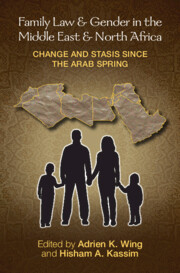Book contents
- Family Law and Gender in the Middle East and North Africa
- Family Law and Gender in the Middle East and North Africa
- Copyright page
- Contents
- Contributors
- Acknowledgments
- Introduction
- 1 Sustained Reforms
- 2 Family Law in Egypt
- 3 Women’s Rights in the Moroccan Family Code
- 4 Postponing Equality in the Algerian Family Code
- 5 Juristic and Legislative Rulemaking
- 6 The Status of Muslim Women in the Mosaic of Islamic Family Law in Lebanon
- 7 In Circles We Go
- 8 The Palestinian Minority in Israel
- 9 West Bank and Gaza Personal Status Law
- 10 Qatari Family Law, When Custom Meets Shari′a
- Glossary
- Bibliography
- Index
7 - In Circles We Go
A Historical Overview of the Jordanian Personal Status Law
Published online by Cambridge University Press: 18 May 2023
- Family Law and Gender in the Middle East and North Africa
- Family Law and Gender in the Middle East and North Africa
- Copyright page
- Contents
- Contributors
- Acknowledgments
- Introduction
- 1 Sustained Reforms
- 2 Family Law in Egypt
- 3 Women’s Rights in the Moroccan Family Code
- 4 Postponing Equality in the Algerian Family Code
- 5 Juristic and Legislative Rulemaking
- 6 The Status of Muslim Women in the Mosaic of Islamic Family Law in Lebanon
- 7 In Circles We Go
- 8 The Palestinian Minority in Israel
- 9 West Bank and Gaza Personal Status Law
- 10 Qatari Family Law, When Custom Meets Shari′a
- Glossary
- Bibliography
- Index
Summary
This chapter examines the development of the Jordanian Personal Status Law (JPSL) from the Ottoman Family Rights Law (1917) to the 2019 reforms. It provides an overview of the main changes which the JPSL has undergone. Centrally, the chapter argues that most changes have not been progressive in terms of leading to greater gender equality or justice. In addition to being discriminatory in terms of sex, the JPSL also enshrines class hierarchies. Where alterations have been made, they have not touched the overall rationale of the law. There were no efforts to revisit the sources of the law, to rethink certain assumptions which were based on seventh-century Arabian society, or stem from conservative colonial European jurisprudence, or to think of alternative "Islamic versions." Unlike their Ottoman predecessors, Jordanian legislators have stayed clear from rethinking the JPSL in terms of current times and requirements.
Keywords
- Type
- Chapter
- Information
- Family Law and Gender in the Middle East and North AfricaChange and Stasis since the Arab Spring, pp. 127 - 148Publisher: Cambridge University PressPrint publication year: 2023

